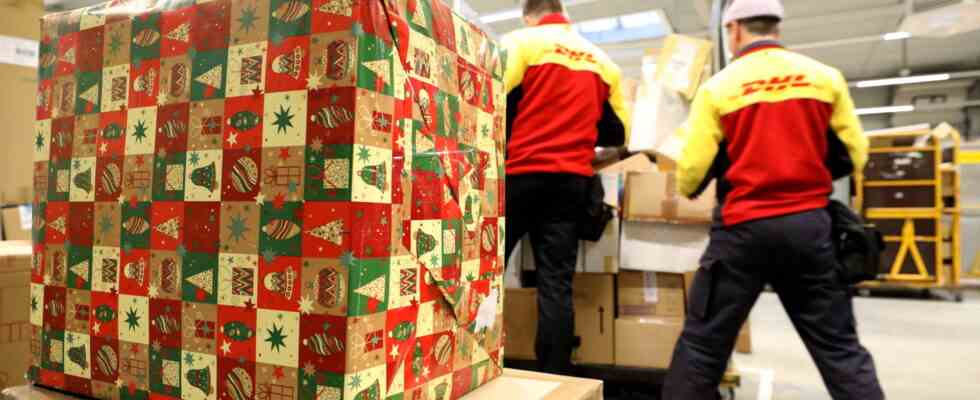Status: 12/20/2022 10:57 am
Every year – millions of packages go on their way at Christmas. This not only puts a strain on the deliverers, but also on the climate. Many providers now also offer climate-neutral shipping. How sustainable is that?
memo AG in Greußenheim near Würzburg is a classic online retailer. There are around 25,000 items in the hall, busy employees push their way through the aisles while one package after the other is pushed onto the conveyor belt at the packing table. Every year 300,000 parcels and packages reach customers throughout Germany. Frank Schmähling, one of the board members, emphasizes how important sustainability is for his company. “We are guided by the concept of ‘avoiding before reducing before compensating’. So it was logical for us to choose climate-friendly shipping.”
Climate neutrality for many providers
As a result, many packages say GoGreen. Behind it is Deutsche Post DHL. As a business customer, the company pays an additional EUR 0.02 per package. This guarantees memo AG climate-neutral shipping, at least according to the official interpretation.
Your second shipping partner, postal competitor DPD, also transports in a climate-neutral manner and, unlike DHL, at no extra charge and without a separate note on the package. Does that now mean that the parcels are picked up from the retailer by bike or transported by electric vehicle? What exactly is “climate neutral”?
What exactly is “climate neutral”?
DHL’s statement offers a first indication of what’s behind it: “There is no specific reference to the individual shipments with this service.” Instead, a parcel can be described as climate-neutral by the shipping company if, at least in mathematical terms, no climate-damaging gases increase.
There are two options: either the logistician tries to avoid CO2 emissions during transport, which is almost impossible – or to reduce them. The usual procedure remains to compensate for the CO2 emissions retrospectively via emissions trading. So the magic of the green Christmas is more for the label. Gerd Seber, manager of the DPD Group for logistics explains: “We offset the CO2 emissions from all consumptions of energy, fuel and paper. We purchase CO2 certificates for this.”
Who offers what?
Whether UPS, GLS, DHL, DPD or Hermes, the large parcel services all offer some kind of climate-neutral shipping with different concepts and different pricing. Either exclusively for business customers, such as Hermes, or also for private customers. For them it is usually free of charge, as with GLS, DHL and DPD. “At least something,” says Schmähling from memo AG. Because it is clear to him: “Of course, every package causes greenhouse gases. It is never climate-neutral”.
That’s why he introduced the so-called memo box, a reusable packaging, more than ten years ago. They send customers back. Such a box has up to 250 circulations. Always more ecological than the usual shipping carton. But there still remains the transport. And the logistics companies only calculate the emissions from their own supply chain when offsetting. Anything beyond that remains unrecorded. In 2022, 40 percent of the delivery fleet at DHL will run on diesel, while at DPD the share of the e-fleet is not even double-digit. The company does not want to give any further details.
Widespread greenwashing
Companies like to promise climate neutrality and advertise with it. They want to reduce their climate emissions to zero. However, a study by the New Climate Institute has now brought something else to light: namely deception, trickery, widespread greenwashing. Instead of aiming for a 100 percent reduction with “net zero”, they only commit to an average reduction of 40 percent. Thomas Day, lead author of the CCRM, sums it up this way: “Their ambitious-sounding promises all too often lack real substance, which can mislead consumers and regulators.” One of the 25 companies evaluated (including E.ON and Unilever) was Deutsche Post DHL. In the ranking among the worst.
Other parcel services were not included in the study. But logistics manager at DPD, Seber, sounds very similar: “These are big goals that we use as a guide when we’re at net zero. There’s no fixed year for that yet, because of course that means that all the things I cannot change, cannot abolish, yes, must build up some form of equivalent value.”

